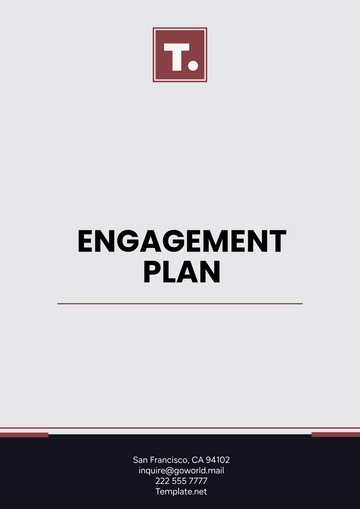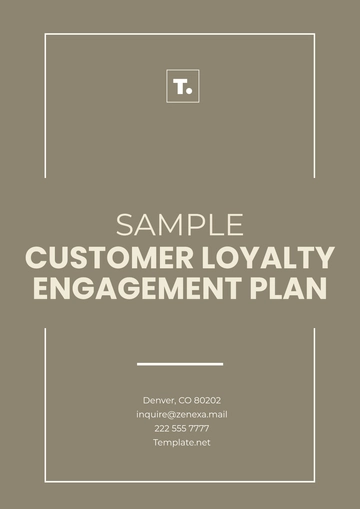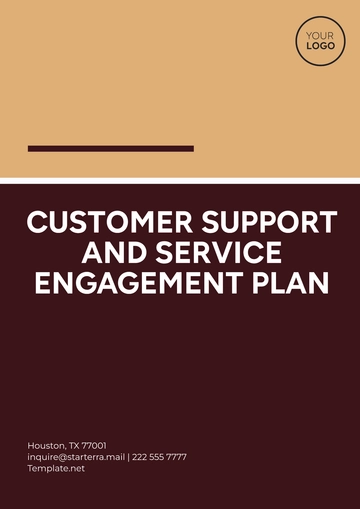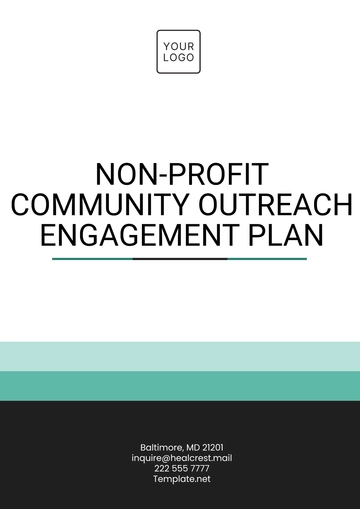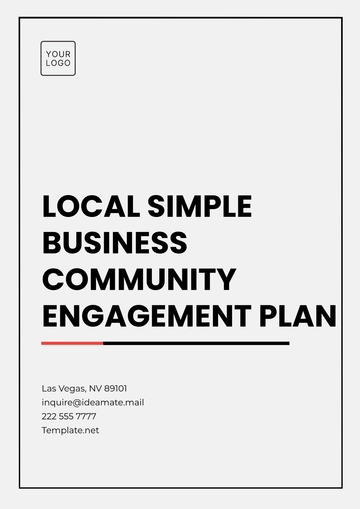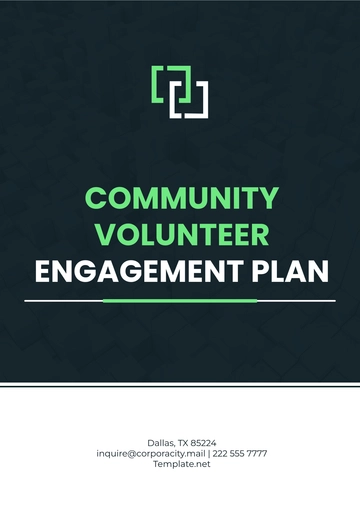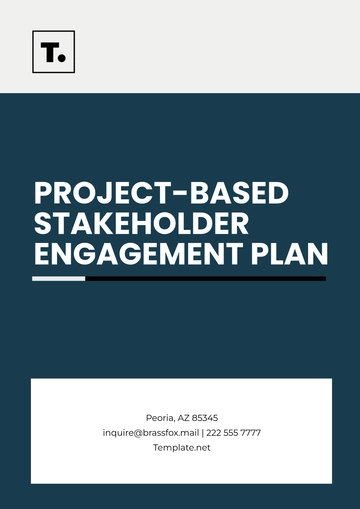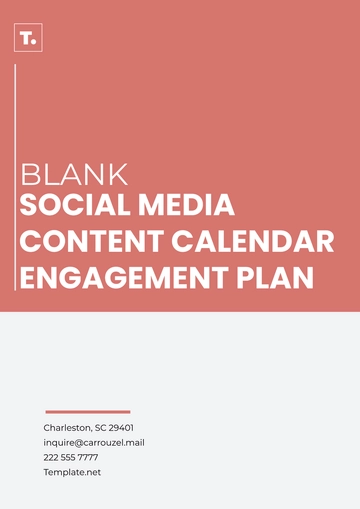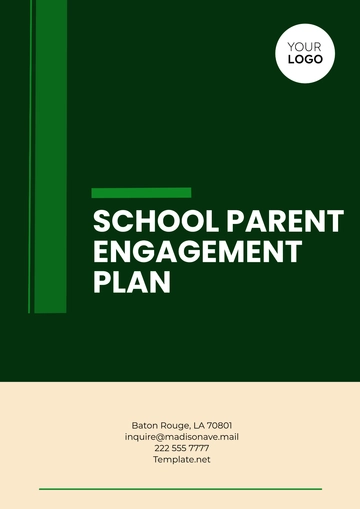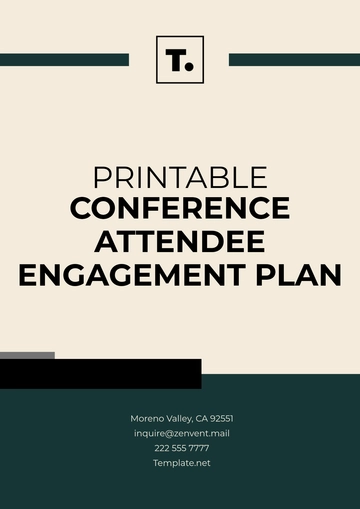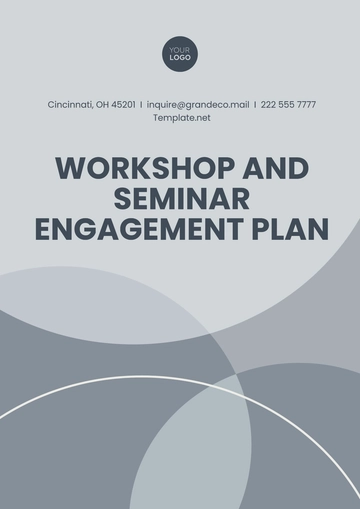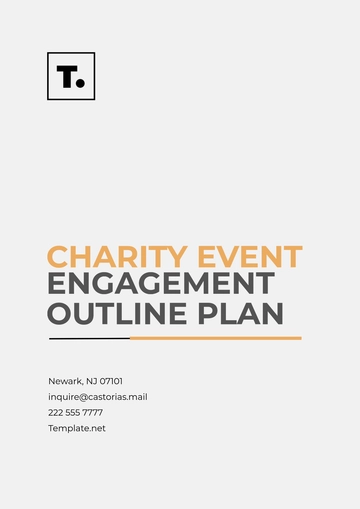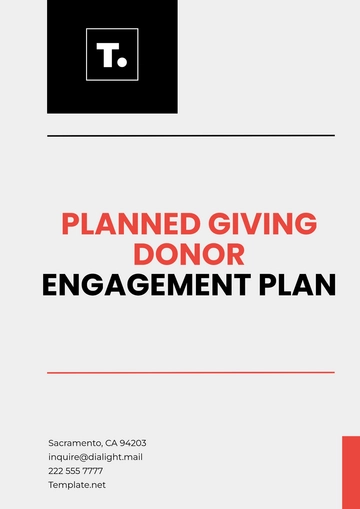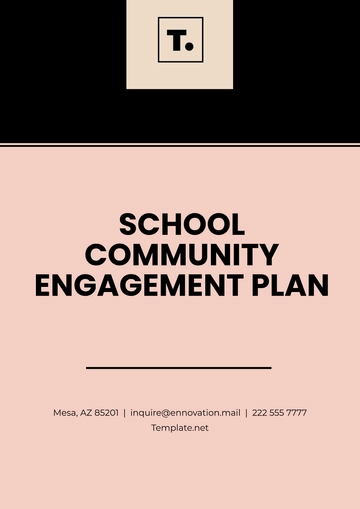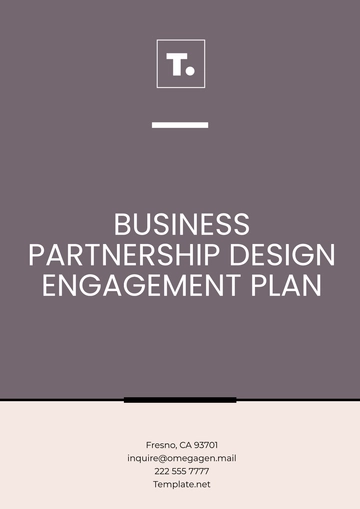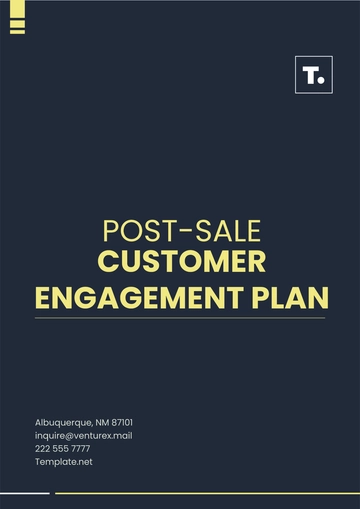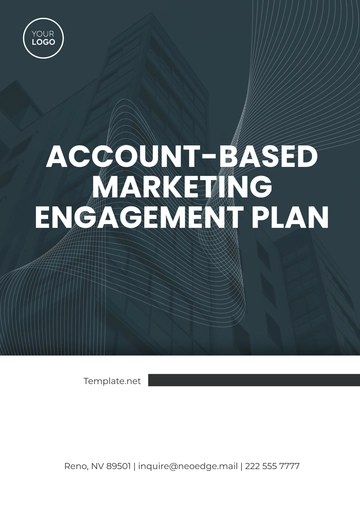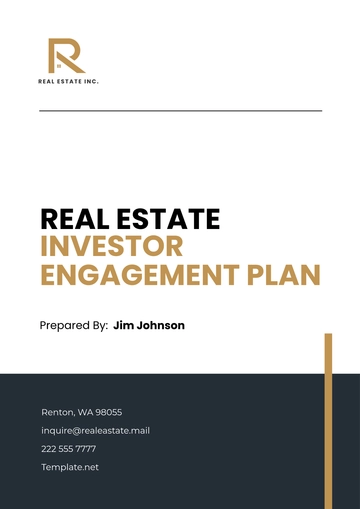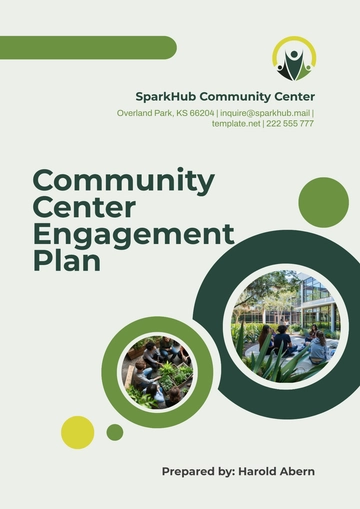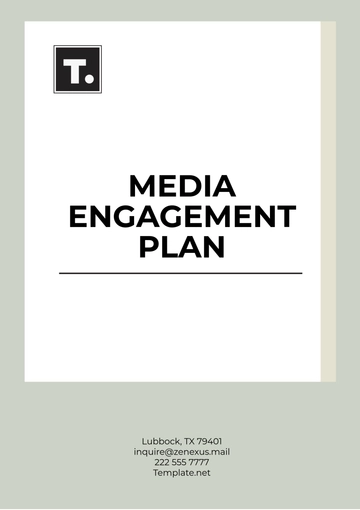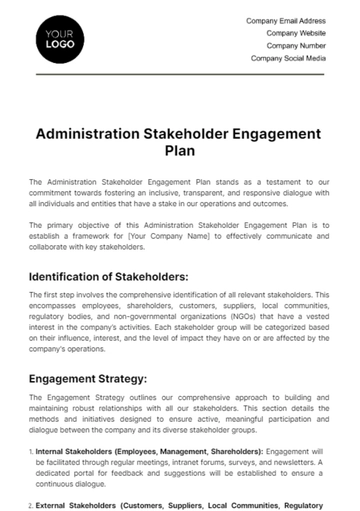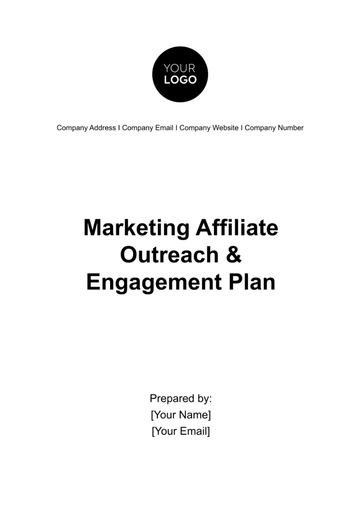Free Engagement Plan
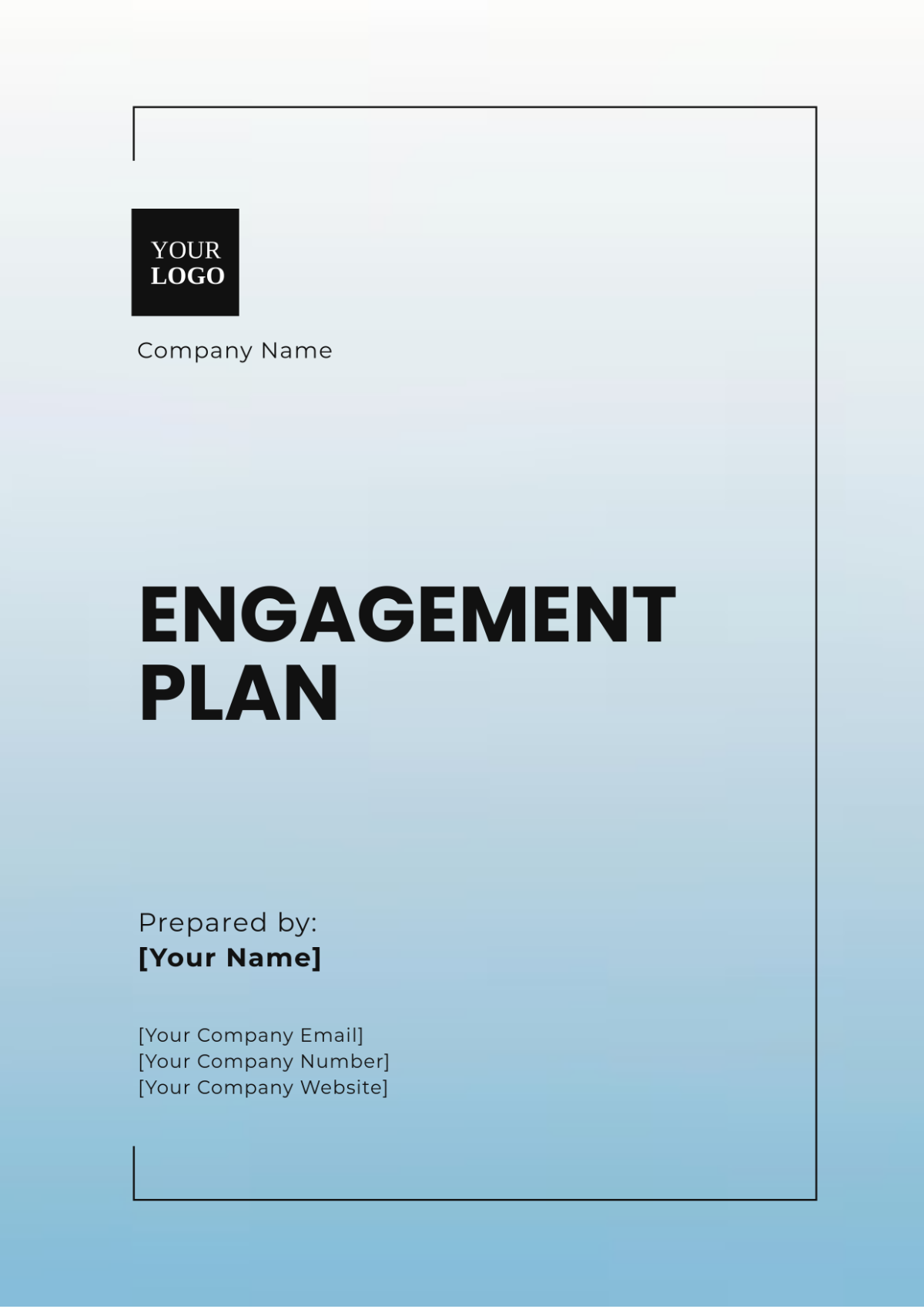
Prepared By: [Your Name]
Date: October 5, 2050
Organization Name: [Your Company Name]
1. Introduction
This engagement Plan outlines strategies for building and maintaining strong relationships with key stakeholders, including customers, employees, partners, and community members. The plan promotes communication, understanding, and collaboration to achieve organizational goals and improve engagement.
2. Objectives
Strengthen relationships with key stakeholders.
Improve communication channels for timely updates and feedback.
Enhance participation and involvement in organizational activities.
Increase stakeholder satisfaction by addressing needs and concerns effectively.
Build trust and transparency through consistent, clear engagement efforts.
3. Stakeholder Identification
Identifying key stakeholders is essential for ensuring that engagement efforts are targeted and effective.
Stakeholder Group | Description | Role in Engagement |
|---|---|---|
Customers | Individuals or entities purchasing products/services | Provide feedback, loyalty |
Employees | Internal staff involved in day-to-day operations | Implement engagement efforts, provide input |
Partners | Organizations or individuals collaborating with [Your Company Name] | Support strategic goals, share resources |
Community Members | Local communities affected by the organization’s activities | Engage in outreach, provide feedback |
Investors | Financial backers and shareholders | Ensure transparency, provide updates |
4. Engagement Strategies
Outlined below are the key strategies for engaging each stakeholder group.
4.1 Customers
Objective: Increase customer satisfaction and brand loyalty through effective communication and feedback loops.
Engagement Methods:
Regular newsletters and updates on new products or services.
Social media interactions for real-time feedback.
Surveys to measure satisfaction and gather suggestions for improvement.
Special loyalty programs and discounts for long-term customers.
4.2 Employees
Objective: Foster a culture of inclusion, transparency, and participation within the organization.
Engagement Methods:
Regular town hall meetings to discuss updates and future initiatives.
Internal feedback platforms to ensure employee voices are heard.
Professional development programs to invest in employee growth.
Social events and team-building activities to strengthen relationships.
4.3 Partners
Objective: Strengthen collaboration and align goals to enhance mutual success.
Engagement Methods:
Quarterly review meetings to assess progress and align future goals.
Collaborative projects and joint initiatives to deepen partnerships.
Regular updates on strategic developments that impact partners.
4.4 Community Members
Objective: Build positive relationships and demonstrate corporate social responsibility.
Engagement Methods:
Community outreach programs focused on education, health, and the environment.
Public consultations on projects that may affect local communities.
Volunteering initiatives to encourage employee engagement with the community.
Regular updates via local media or community meetings.
4.5 Investors
Objective: Maintain transparency and build trust with financial stakeholders.
Engagement Methods:
Quarterly financial reports and regular investor briefings.
Annual shareholder meetings to discuss long-term plans.
Open channels for investors to raise concerns or provide input.
5. Communication Channels
The following communication channels will be used to ensure efficient and effective engagement:
Stakeholder Group | Communication Channel | Frequency of Engagement |
|---|---|---|
Customers | Email, Social Media, Website | Monthly updates, as needed |
Employees | Intranet, Emails, Town Halls | Weekly to quarterly |
Partners | Meetings, Emails, Collaborative Portals | Quarterly or as required |
Community Members | Local Media, Social Media, Public Forums | Quarterly to semi-annually |
Investors | Investor Reports, Annual Meetings | Quarterly, Annually |
6. Timeline
A clear timeline is essential for tracking engagement activities and ensuring consistent communication.
Milestone | Deadline | Responsible Team |
|---|---|---|
Launch customer feedback survey | January 2051 | Marketing Team |
Hold employee town hall meeting | March 2051 | HR Department |
Partner collaboration meeting | April 2051 | Business Development Team |
Community outreach event | June 2051 | CSR Department |
Investor update report | September 2051 | Finance Department |
7. Evaluation and Monitoring
To ensure the effectiveness of the Engagement Plan, continuous monitoring and evaluation processes will be implemented:
Feedback Surveys: Regularly distributed to customers, employees, and community members to assess satisfaction and areas for improvement.
Engagement Metrics: Tracking key metrics such as customer retention rates, employee satisfaction, and community involvement.
Quarterly Reviews: Meetings to evaluate progress, identify challenges, and adjust engagement strategies as necessary.
Evaluation Metric | Target |
|---|---|
Customer Satisfaction | 85% positive feedback |
Employee Engagement | 75% participation in activities |
Community Involvement | 60% participation in programs |
8. Conclusion
This Engagement Plan provides a roadmap for building meaningful and lasting stakeholder relationships. The organization aims to improve engagement, foster collaboration, and achieve long-term success by focusing on communication, feedback, and involvement. The plan will be regularly reviewed and updated to ensure its continued effectiveness.
- 100% Customizable, free editor
- Access 1 Million+ Templates, photo’s & graphics
- Download or share as a template
- Click and replace photos, graphics, text, backgrounds
- Resize, crop, AI write & more
- Access advanced editor
Enhance your team's collaboration with the Engagement Plan Template from Template.net. This editable and customizable resource empowers you to tailor your strategies effortlessly. Utilize our AI Editor Tool to modify elements quickly, ensuring your engagement initiatives align perfectly with your goals. Streamline your planning process and foster stronger connections with this versatile template!
You may also like
- Finance Plan
- Construction Plan
- Sales Plan
- Development Plan
- Career Plan
- Budget Plan
- HR Plan
- Education Plan
- Transition Plan
- Work Plan
- Training Plan
- Communication Plan
- Operation Plan
- Health And Safety Plan
- Strategy Plan
- Professional Development Plan
- Advertising Plan
- Risk Management Plan
- Restaurant Plan
- School Plan
- Nursing Home Patient Care Plan
- Nursing Care Plan
- Plan Event
- Startup Plan
- Social Media Plan
- Staffing Plan
- Annual Plan
- Content Plan
- Payment Plan
- Implementation Plan
- Hotel Plan
- Workout Plan
- Accounting Plan
- Campaign Plan
- Essay Plan
- 30 60 90 Day Plan
- Research Plan
- Recruitment Plan
- 90 Day Plan
- Quarterly Plan
- Emergency Plan
- 5 Year Plan
- Gym Plan
- Personal Plan
- IT and Software Plan
- Treatment Plan
- Real Estate Plan
- Law Firm Plan
- Healthcare Plan
- Improvement Plan
- Media Plan
- 5 Year Business Plan
- Learning Plan
- Marketing Campaign Plan
- Travel Agency Plan
- Cleaning Services Plan
- Interior Design Plan
- Performance Plan
- PR Plan
- Birth Plan
- Life Plan
- SEO Plan
- Disaster Recovery Plan
- Continuity Plan
- Launch Plan
- Legal Plan
- Behavior Plan
- Performance Improvement Plan
- Salon Plan
- Security Plan
- Security Management Plan
- Employee Development Plan
- Quality Plan
- Service Improvement Plan
- Growth Plan
- Incident Response Plan
- Basketball Plan
- Emergency Action Plan
- Product Launch Plan
- Spa Plan
- Employee Training Plan
- Data Analysis Plan
- Employee Action Plan
- Territory Plan
- Audit Plan
- Classroom Plan
- Activity Plan
- Parenting Plan
- Care Plan
- Project Execution Plan
- Exercise Plan
- Internship Plan
- Software Development Plan
- Continuous Improvement Plan
- Leave Plan
- 90 Day Sales Plan
- Advertising Agency Plan
- Employee Transition Plan
- Smart Action Plan
- Workplace Safety Plan
- Behavior Change Plan
- Contingency Plan
- Continuity of Operations Plan
- Health Plan
- Quality Control Plan
- Self Plan
- Sports Development Plan
- Change Management Plan
- Ecommerce Plan
- Personal Financial Plan
- Process Improvement Plan
- 30-60-90 Day Sales Plan
- Crisis Management Plan
- Engagement Plan
- Execution Plan
- Pandemic Plan
- Quality Assurance Plan
- Service Continuity Plan
- Agile Project Plan
- Fundraising Plan
- Job Transition Plan
- Asset Maintenance Plan
- Maintenance Plan
- Software Test Plan
- Staff Training and Development Plan
- 3 Year Plan
- Brand Activation Plan
- Release Plan
- Resource Plan
- Risk Mitigation Plan
- Teacher Plan
- 30 60 90 Day Plan for New Manager
- Food Safety Plan
- Food Truck Plan
- Hiring Plan
- Quality Management Plan
- Wellness Plan
- Behavior Intervention Plan
- Bonus Plan
- Investment Plan
- Maternity Leave Plan
- Pandemic Response Plan
- Succession Planning
- Coaching Plan
- Configuration Management Plan
- Remote Work Plan
- Self Care Plan
- Teaching Plan
- 100-Day Plan
- HACCP Plan
- Student Plan
- Sustainability Plan
- 30 60 90 Day Plan for Interview
- Access Plan
- Site Specific Safety Plan
